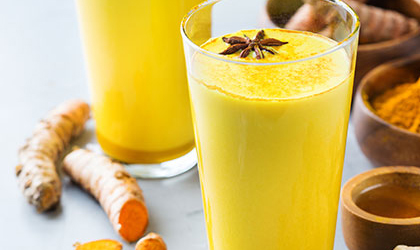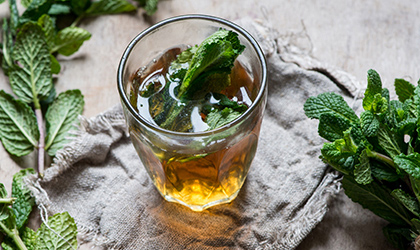
Keeping your immunity in fighting-fit condition isn’t always an easy feat. You see, the immune system is one that relies on a host of checks and balances – both an overactive and underactive immune system can throw your body into disarray. The bottom line is that a healthy body needs a healthy immune system: if you nourish yourself, the immune system will nourish itself. So, in addition to eliminating destructive habits (ahem, ahem: smoking, excessive drinking, and sleep deprivation – we’re looking at you), stressors, and toxins from your lifestyle, embracing these immunity superfoods will give your body’s natural defences a helping hand all year round. Take that invading pathogens!
Echinacea
Echinacea has been used in traditional herbal medicine for centuries, and in recent years it has become one of the most extensively used herbal remedies in the world. Studies suggest that complex substances called ‘phenolic compounds’ are responsible for echinacea’s immune supporting properties. Echinacea has been traditionally used to relieve the symptoms of the common cold and influenza type infections. Coming down with a sniffle? It’s time to fix yourself a cup of warming echinacea tea.
Elderberry
For centuries, people have used the elderberry plant for its therapeutic properties. It was Hippocrates, the ‘father of medicine’, who first recognised the extraordinary health credentials of elderberries, using them to combat colds, flu, and allergies. Elderberries are rich in tons of antioxidants, too (anthocyanidins, flavonols, and vitamin C, to be precise), meaning they also have the power to fight inflammation and free radical damage in the body. A report published in the Journal of International Medical Research revealed that when elderberries were consumed within the first 48 hours of catching flu, the symptoms dissipated approximately four days earlier than the average i. Plus, the use of pain relief was considerably less amongst those who received the elderberry compared to the placebo. When cold and flu season strikes, make sure your kitchen is well stocked with plenty of elderberry juice.
Vitamin C
The antioxidant powerhouse, vitamin C – or more scientifically termed, ‘ascorbic acid’ – benefits practically every aspect of your immunity. Not only does it act as a first line of attack against free radical damage, but it supports some of the most important defenders in your immune system, too: ‘neutrophils’ that fight bacterial infections; ‘natural killer cells’ (NK) that eliminate infectious targets; ‘antibodies’ that destroy invading threats; and ‘lymphocytes’ that produce antibodies ii. It’s not surprising, then, that so many controlled trials have pointed to vitamin C’s ability to ameliorate respiratory tract infections and the common cold iii. Your body struggles to store vitamin C, so you need a plentiful supply from your diet to keep your reserves topped up. When you’re feeling under the weather, load up on citrus fruits, peppers, strawberries, broccoli, and tomatoes to reinforce your body’s natural defences. Bonus: iron helps with the absorption of vitamin C, so partner your intake with a serving of beans, spinach or quinoa for the ultimate immune-supporting fix.
Ginger
This pungent root won’t just add a measure of flavour and zing to your meals; it will support your immune defences, too. Ginger has been widely touted for its anti-inflammatory, antioxidant and antimicrobial credentials, making it nature’s perfect food to bolster your immune responses iv. This ‘spice of life’ has also earned its stripes as an anti-nausea agent, supporting digestion and soothing sickness v. Experts purport this knobbly root is jam-packed with chemicals that positively impact the stomach, nervous system and intestines to reduce nausea vi. To keep illness at bay – or soothe it when it does strike – try sipping on some fresh ginger and lemon tea. There…that’s better.
Cinnamon
Need another reason to sprinkle a dash of cinnamon on your latte? Listen up. This festive spice doesn’t only help balance your blood sugar, but it’s also brimming with antioxidants and anti-inflammatory compounds that protect your body against invading infections, tissue damage and nefarious free radicals vii. Interestingly, a study that compared the antioxidant activity of 26 spices found our flavoursome friend, cinnamon, to be the most potent viii! The real beauty of cinnamon is it’s incredibly versatile, making it the perfect addition to curries, porridge, smoothies and even fresh fruit.
Turmeric
If you’ve done any snooping around the health and wellness corner of the Internet, you’ll know the buzzword ‘turmeric’ crops up a lot. But it wholly deserves its moment in the spotlight. Thanks to its mighty antimicrobial, anti-inflammatory and antioxidant properties, turmeric is brilliant for immunity ix. According to a raft of evidence, turmeric’s active compound, curcumin, may provide some support against cardiovascular risks, metabolic syndrome, and even cognitive decline x. Pro cooking tip: to ensure turmeric is readily absorbed into the bloodstream, always serve it with fat-containing foods. Feeling run down? Try making a mug of nourishing golden milk, which combines turmeric, cinnamon and a milk or your choice (coconut milk works a treat!). Read more about the easy ways to incorporate turmeric into your diet here.
Zinc
No immunity food list would be complete without a mention of the antioxidant zinc – a powerful weapon for your body’s natural defences. Even a small deficiency of this mineral can undermine your immune function, leading to a reduction in natural killer, cells, T cells and antibodies, as well as poor immune cell responses xi. Like vitamin C, your body doesn’t readily store zinc, so you need to consume a plentiful amount every day to keep your nutrient reserves topped up. Legumes, eggs, shellfish, meat, nuts, seeds and whole grains are abundant in this antioxidant superstar.
Probiotics
Did you know 70 to 80 per cent of your immune tissue is located in your digestive tract? Yup, a healthy gut and healthy immune system go hand in hand. And it makes sense when you think about it: your gut has to process and fight pathogens in everything you consume, thus it needs strong defences to prevent illness and ward off infectious attacks xii. Different strains of gut flora bolster your immune function, so having enough ‘good’ bacteria in your gut is vital. A strong gut can help tackle everything from the common cold to autoimmune diseases to IBS. Eating more fermented foods, like sauerkraut, kimchi, kefir and kombucha, will give your gut with a good dose of friendly bacteria and work wonders for your immunity.
References:
-
Zakay-Rones, Z., Thom, E., Wollan, T. & Wadstein, J. (2004). Randomized Study of the Efficacy and Safety of Oral Elderberry Extract in the Treatment of Influenza A and B Virus Infections. Journal of International Medical Research, 32(2), 132-140.
-
Schwartz-Albiez, R. (2012). Naturally occurring antibodies directed against carbohydrate tumor antigens. Adv Exp Med Biol. 750, 27-43.
-
Wintergerst, E.S., Maggini, S., Hornig, D.H. (2006). Immune-enhancing role of vitamin C and zinc and effect on clinical conditions. Ann Nutr Metab. 50(2), 85-94.
Hemila, H., Douglas, R.M. (1999). Vitamin C and acute respiratory infections. Int J Tuberc Lung Dis. 3 (9), 756-61. -
Mashhadi, N.S., Ghiasvand, R., Askari, G., Hariri, M., Darvishi, L. & Mofid, M.R. (2013). Anti-oxidative and anti-inflammatory effects of ginger in health and physical activity: review of current evidence. International journal of preventive medicine, 4(Suppl 1), S36-42.
-
Marx, W., Ried, K., McCarthy, A., Vitetta, L., Sali, A., McKavanagh, D. & Isenring, L. (2015). Ginger—Mechanism of action in chemotherapy-induced nausea and vomiting: A review. Critical Reviews in Food Science and Nutrition, 57(1), 141-146.
-
Wu, K.L., Rayner, C.K., Chuah, S.K., editors. et al. (2008). Effects of ginger on gastric emptying and motility in healthy humans. Eur J Gastroenterol Hepatol. 20(5), 436–40.
-
Rao, P.V. & Gan, S.H. (2014). Cinnamon: a multifaceted medicinal plant. Evidence-based complementary and alternative medicine: eCAM, 2014, 642942.
-
Shan, B., Cai, Y., Sun, M., Corke, H. (2005). Antioxidant Capacity of 26 Spice Extracts and Characterization of Their Phenolic Constituents. Journal of Agricultural and Food Chemistry, 53(20), 7749-7759.
-
Jurenka, J.S. (2009). Anti-inflammatory properties of curcumin, a major constituent of Curcuma longa: a review of preclinical and clinical research. Altern Med Rev. 14 (2), 141-153.
-
Chainani-Wu, N. (2003). Safety and Anti-Inflammatory Activity of Curcumin: A Component of Tumeric (Curcuma longa). The Journal of Alternative and Complementary Medicine, 9(1), 161-168.
Goel, A., Boland, C., Chauhan, D. (2001). Specific inhibition of cyclooxygenase-2 (COX-2) expression by dietary curcumin in HT-29 human colon cancer cells. Cancer Letters, 172(2), 111-118. -
Larson, C.P., Roy, S.K., Khan, A.I., et al. (2008). Zinc treatment to under-five children: applications to improve child survival and reduce burden of disease. J Health Popul Nutr. 26(3), 356-365.
-
Wu, H.J. & Wu, E. (2012). The role of gut microbiota in immune homeostasis and autoimmunity. Gut microbes. 3(1), 4-14.
You Might Also Like

Olivia
Olivia Salter has always been an avid health nut. After graduating from the University of Bristol, she began working for a nutritional consultancy where she discovered her passion for all things wellness-related. There, she executed much of the company’s content marketing strategy and found her niche in health writing, publishing articles in Women’s Health, Mind Body Green, Thrive and Psychologies.
View More



